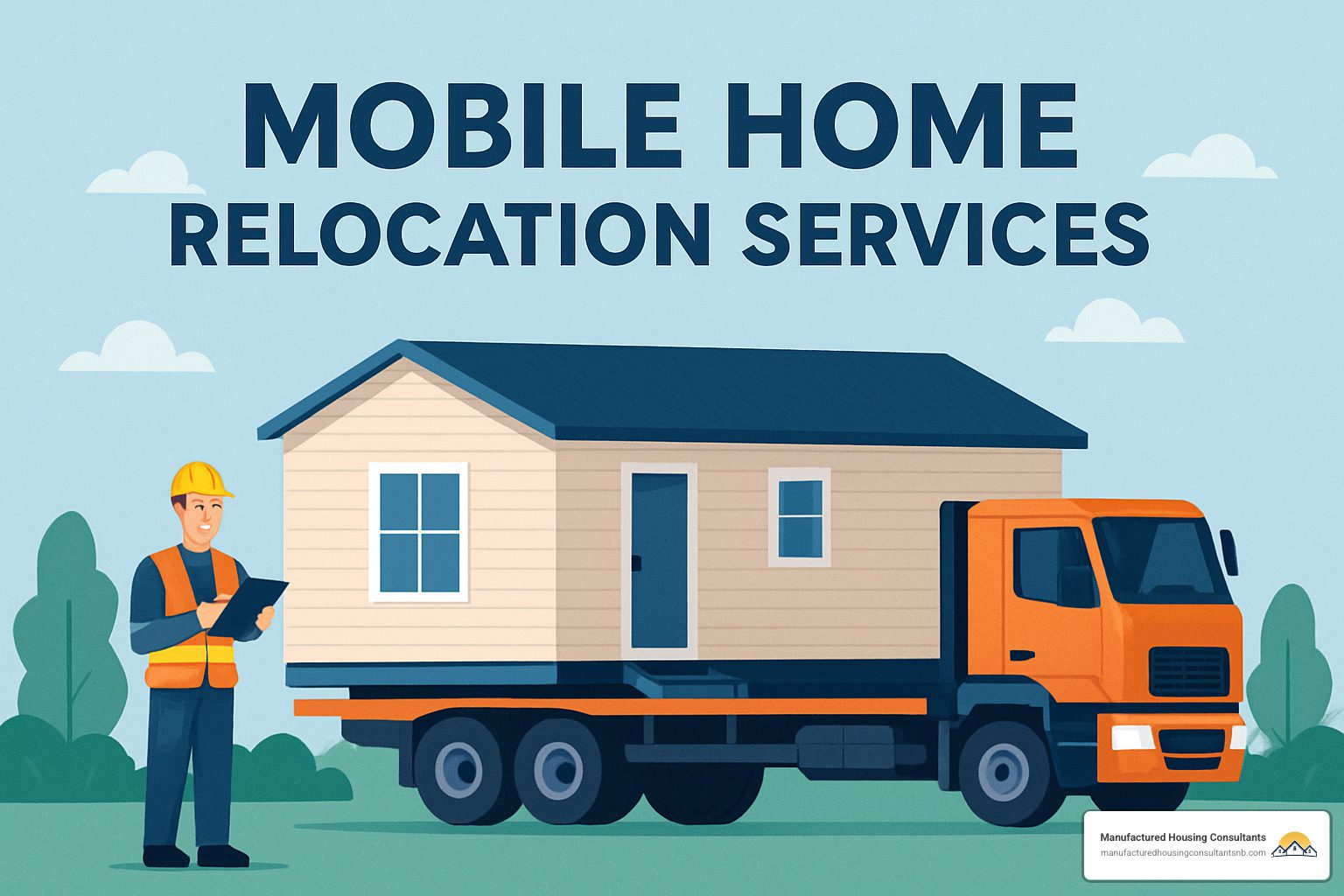The Most Effective Solution for Mobile Home Relocation Services
Discover Mobile home relocation services—costs, process, legal tips, and expert advice for a safe, stress-free move.
Understanding Mobile Home Relocation: What You Need to Know
Thinking about moving your mobile home? You’re about to start on quite the trip! Mobile home relocation services involve much more than just hitching your home to a truck and hitting the road. These specialized services ensure your manufactured home travels safely from point A to point B, with professionals handling everything from disconnection to transport and reinstallation.
I often tell folks that moving a mobile home is like orchestrating a carefully choreographed dance. Each step matters, and the right expertise makes all the difference between a smooth move and a stressful one.
Here’s what you can expect when it comes to relocating your mobile home:
| Service Component | What’s Included | Average Cost |
|---|---|---|
| Transport Only | Basic moving of home to a new location | $700-$3,500 (single-wide up to 60 miles) |
| Full Service | Disconnect, transport, setup, utilities | $3,000-$14,000 (depending on size/distance) |
| Typical Timeline | From planning to move-in | 3-6 weeks |
| Required Permits | Oversize/overweight, state-specific | Varies by location |
| DIY Possible? | No – requires licensed, insured movers | Not recommended for safety and legal reasons |
“Moving a mobile home is a large undertaking that requires careful planning and attention to detail,” as industry experts often remind us. Your home wasn’t designed to be in constant motion, which is why professional handling is so important.
The dimensions alone make this a specialized task. A typical single-wide measures about 15 feet wide and 72 feet long, while a standard double-wide expands to 26 feet wide and 56 feet long. These aren’t exactly dimensions you can steer through regular traffic without proper equipment and permits!
When it comes to your wallet, be prepared for costs ranging from $3,000 to $10,000 or more. What affects the price? Everything from the distance traveled to the age and condition of your home. Most companies charge about $4-$5.50 per mile for the towing vehicle, with an additional $1.50-$1.65 per mile for those required pilot cars that help guide your home safely down the highway.
Why hire professionals? I’ll put it simply: peace of mind. Professional movers bring specialized equipment, handle all the confusing permits, and know the regulations inside and out. They’re also properly insured, which protects your investment if anything unexpected happens during transport. Trust me, this isn’t the time to call your buddy with a truck for a favor!
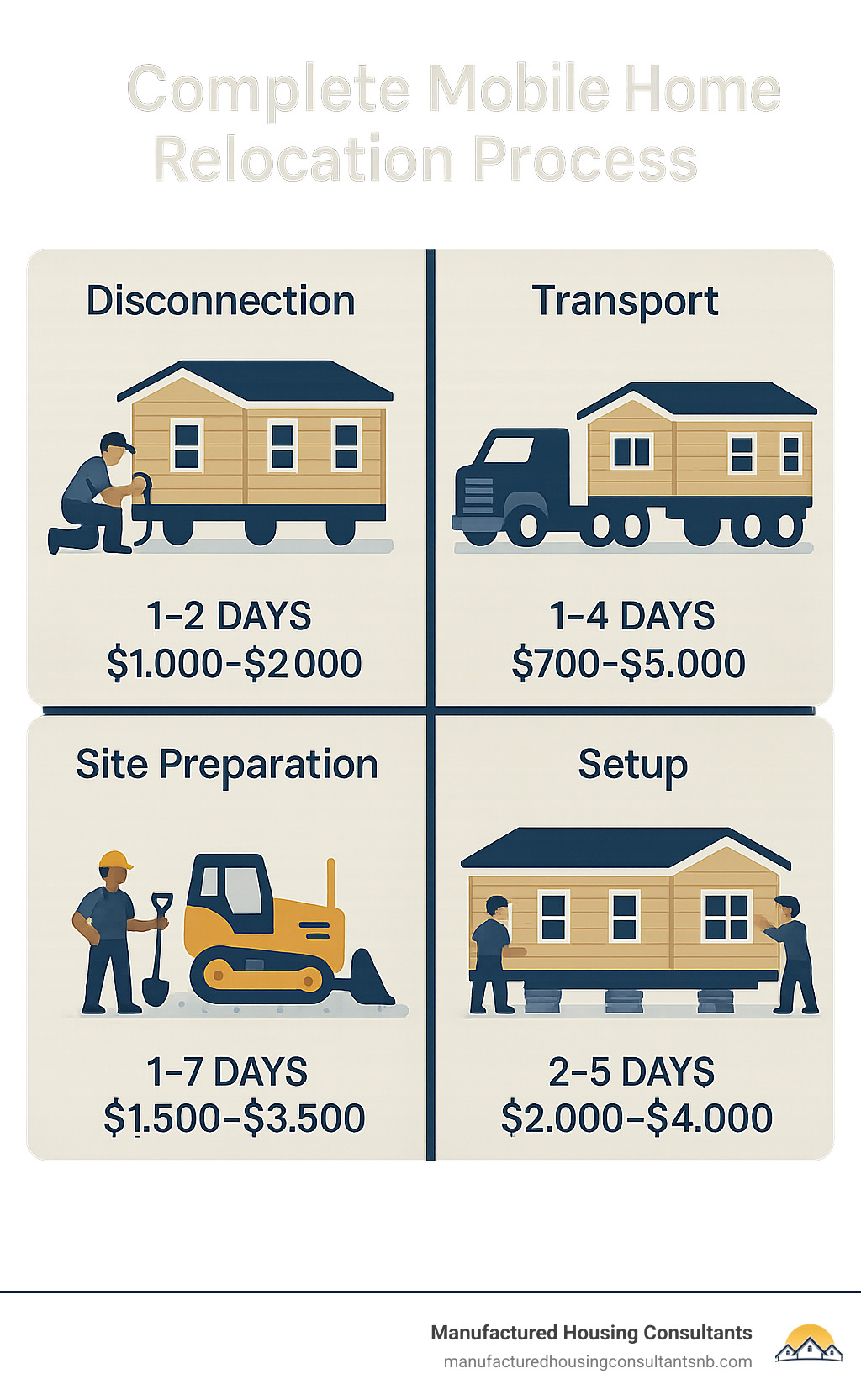
At Manufactured Housing Consultants, we understand that moving your home is about moving your life. Whether you’re relocating to a new community or setting up on your land, our team handles the complex logistics so you can focus on the excitement of your new beginning.
Mobile Home Relocation Services 101: Types, Process & Timeline
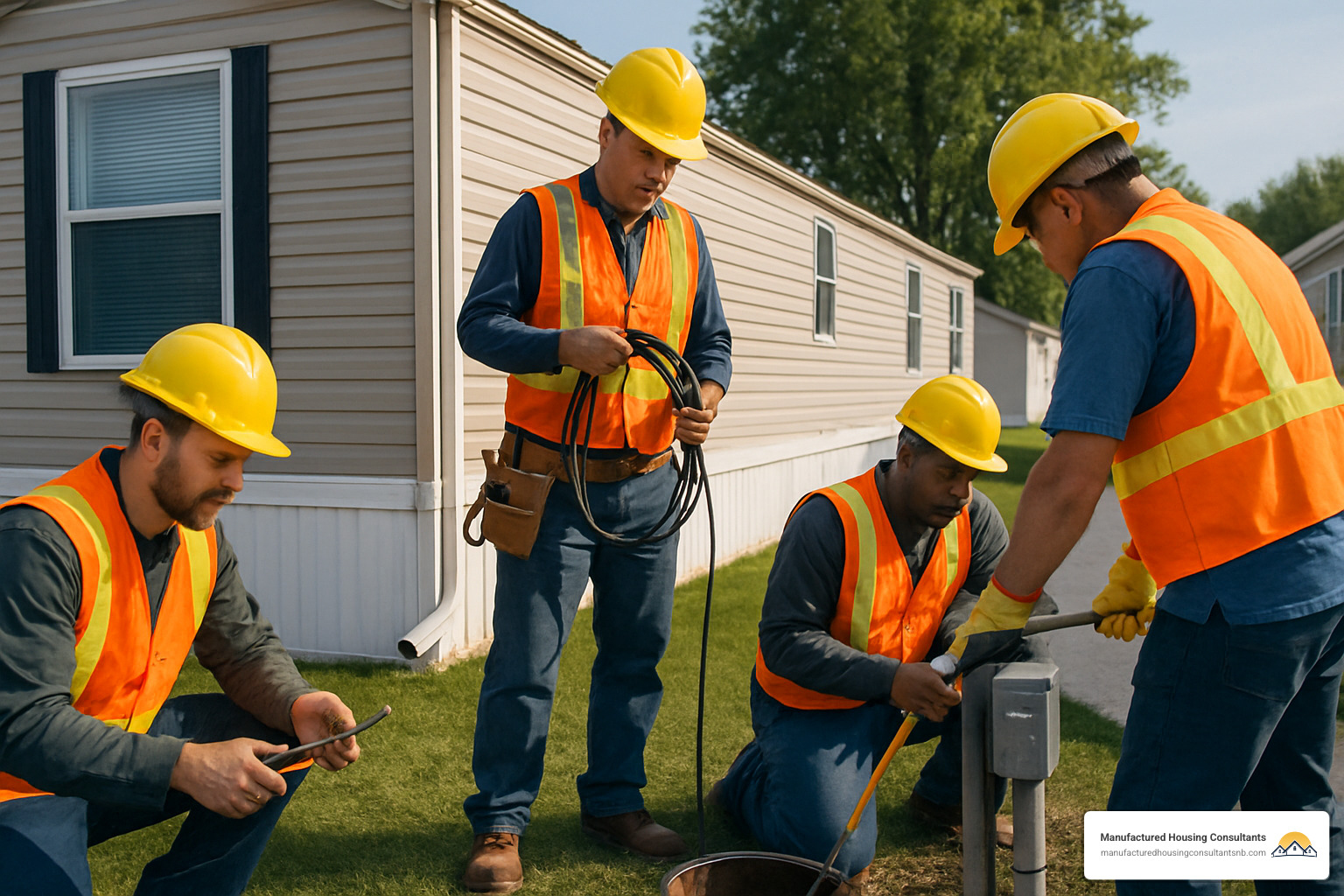
Thinking about relocating your manufactured home? You’re not alone! At Manufactured Housing Consultants, we’ve guided countless Texas homeowners through this journey. Let me walk you through what you need to know – from the types of homes we can move to what happens on moving day.
What Do Mobile Home Relocation Services Include?
Mobile home relocation services cover far more than just hooking up your home to a truck and driving away. Think of it as a comprehensive package designed to get your home safely from here to there – and make it livable again when it arrives.
When you work with professionals like us, we handle everything. We start with a thorough inspection to make sure your home is ready for the road ahead. Then we safely disconnect all utilities – electricity, water, sewer, and gas – so nothing gets damaged during transport.
The prep work continues as we remove skirting and detach any additions like porches or decks. Behind the scenes, we’re busy securing all the necessary permits, planning the safest route, and arranging for escort vehicles if needed.
On moving day, our specialized equipment and experienced crew will transport your home to its new location. Once there, we don’t just drop it off and leave! We handle leveling, blocking, and anchoring your home securely. Then we reconnect all utilities and conduct final inspections to ensure everything meets code requirements.
As Kelly H., one of our happy customers, shared: “Absolute amazing job! We are sooo happy this company was hired to move the home we sold.” That’s the peace of mind we aim to provide with every move.
Want to learn more about our complete service offerings? Visit our Services page.
Types of Homes We Move & Equipment Needed
We’ve moved just about every type of factory-built home you can imagine. Single-wide mobile homes (typically 15 feet wide and 72 feet long) can usually be transported in one piece. Double-wide mobile homes (around 26 feet wide and 56 feet long) need to be separated into two sections for the journey and reassembled at their destination.
We also regularly move triple-wide mobile homes (which come apart into three sections), park models (those smaller recreational units designed for temporary living), and modular homes that were factory-built and assembled on-site.
The equipment we use depends on your specific home. For single-wides, we often can use standard towing equipment, sometimes utilizing the home’s existing chassis. Double and triple-wides require multiple transport vehicles, heavy-duty jacks, and specialized connection equipment. And regardless of size, we arrange for pilot cars for oversized loads, which typically cost about $1.50-$1.65 per mile.
Weight is a big factor in our planning. Older mobile homes typically weigh between 35 to 40 pounds per square foot, while newer manufactured homes tip the scales at 45 to 50 pounds per square foot. To put that in perspective, an 800 square foot single-wide could weigh up to 40,000 pounds—that’s why specialized equipment and experienced handlers are so important!
Step-by-Step Move Timeline — From Notice to Move-In
Wondering how long this whole process takes? Here’s what a typical timeline looks like:
During the first couple of weeks, we focus on planning. If you’re in a mobile home park, you’ll need to provide a 30-day notice to management. This is also when you’ll select and hire us as your transport company, begin the permit application process, schedule utility disconnections, and start preparing your home.
Weeks three and four are all about preparation. We’ll secure all necessary permits (which can take 3-5 months in some locations, so plan ahead!), help you complete home preparations like removing skirting and securing loose items, finalize site preparation at your new location, and confirm the transport date and logistics.
Moving day is when all our preparation pays off. Our professional crew disconnects utilities, prepares your home for transport (attaching axles and wheels if needed), and safely transports it to your new location.
The final phase, usually weeks five and six, involves setting up your home. We’ll place it on its new foundation or piers, level and anchor it securely, reconnect all utilities, install skirting, and conduct final inspections.
As Debby L. recalls from her experience with us: “I didn’t think they were gonna be able to get it in the spot I wanted… turned it around in a tight spot.” That’s the kind of expertise we bring to every move, no matter how challenging.
Risks, Challenges, and DIY vs Professional Movers
I know what you might be thinking: “Could I save money by moving my mobile home myself?” The short answer is no, and here’s why.
Moving a manufactured home involves serious risks. Improper transport can cause frame bending, wall cracks, and roof damage. Road hazards like low bridges, tight turns, and steep grades require expert navigation. There are also legal considerations – homes built for specific wind zones may not be legal in others, and moving without proper permits can result in hefty fines.
Above all, there are safety concerns. The sheer weight and size of mobile homes make them dangerous for inexperienced handlers.
Professional movers like us are essential because we have proper licensing and permits, specialized equipment designed specifically for mobile home transport, comprehensive insurance coverage to protect your investment, deep knowledge of HUD standards and local requirements, and years of experience navigating challenges.
As an industry expert once noted, “No other mobile home hauler will treat your home with the level of care that professional movers will.” That care extends to understanding and following HUD safety standards that govern manufactured housing transport.
When it comes to moving your home – likely one of your biggest investments – this isn’t the time to cut corners. Trust the professionals who move homes every day, and you’ll be settled in your newly relocated home before you know it.
Costs, Legal Requirements, and Choosing the Right Mover
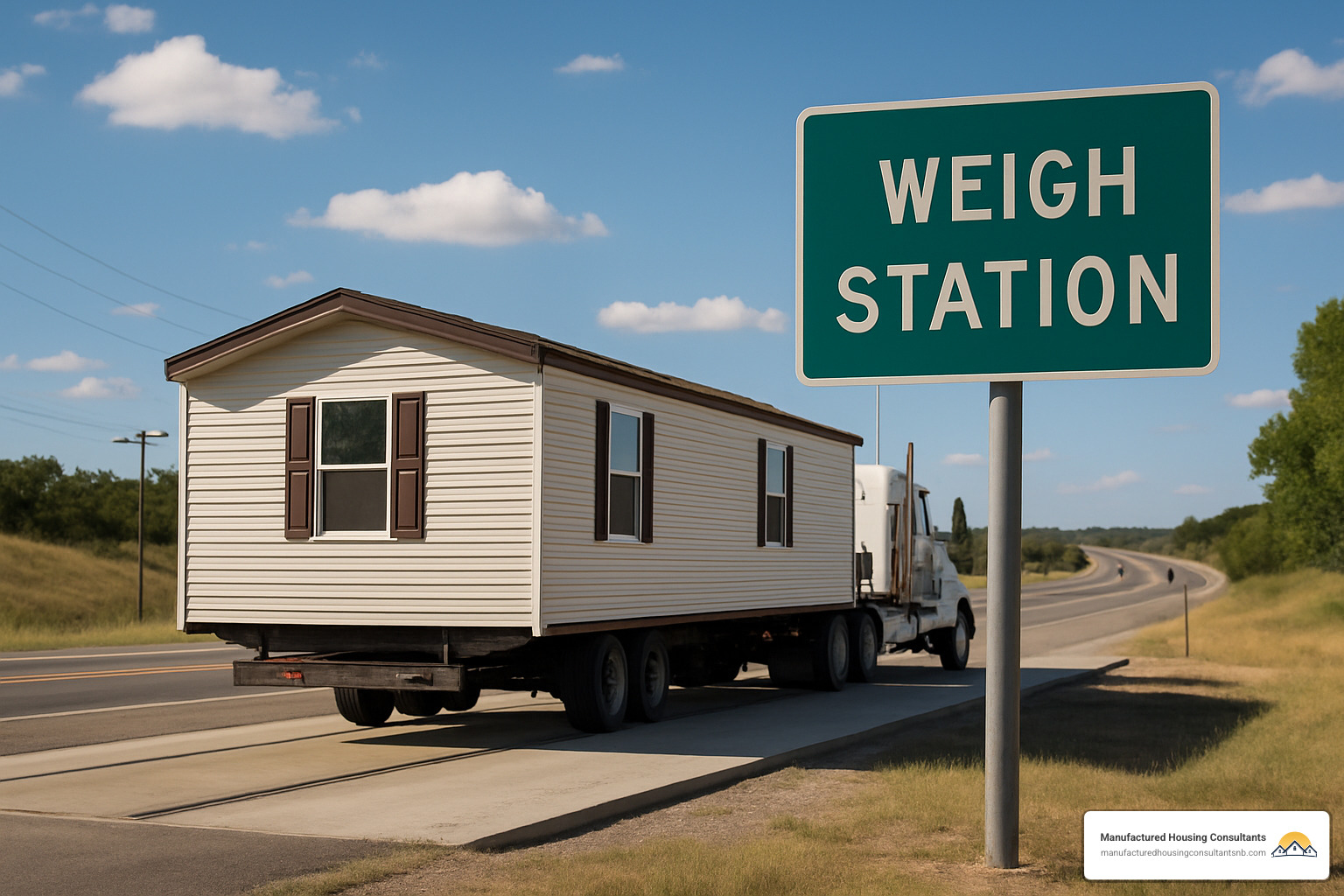
Let’s talk money, paperwork, and finding the right folks to handle your mobile home move. I know these can be the stressful parts of relocating your home, but with a bit of knowledge, you’ll feel much more confident about the journey ahead.
Key Factors That Affect Mobile Home Relocation Costs
When clients ask me about costs, I always explain that moving a mobile home isn’t like moving household furniture—many factors influence the final price tag.
Distance is typically the biggest cost driver. Local moves under 60 miles come with lower base rates, while long-distance journeys will cost you more, usually $4-$5.50 per mile for the main towing vehicle. Think of it like a taxi meter that keeps running the further you go!
Home size matters tremendously. A single-wide might cost $700-$1,000 for transport alone within 60 miles, while a double-wide jumps to $2,000-$2,500 because it requires two separate loads. Triple-wides are even pricier at $2,600-$3,500 since they need three separate trips. It’s simple math—more sections mean more work.
Your home’s weight and condition play crucial roles, too. Older homes typically weigh 35-40 pounds per square foot, while newer models tip the scales at 45-50 pounds per square foot. Homes showing their age might need extra TLC during transport, which adds to your bill.
The extras add up quickly. Escort vehicles (those cars with flashing lights that accompany oversized loads) cost around $1.50-$1.65 per mile each. Setup at your new location runs $1,000 to $5,000, depending on your home’s size. Disconnecting and reconnecting utilities might add another $500-$1,000, while preparing your new site could cost $1,000-$3,000.
Don’t forget permits and inspections! These bureaucratic necessities range from $100-$500 for oversized permits and another $100-$300 for inspections, depending on your state.
Here’s how transport-only versus full-service options compare:
| Service Type | Single-Wide (60 miles) | Double-Wide (60 miles) | Triple-Wide (60 miles) |
|---|---|---|---|
| Transport Only | $700-$1,000 | $2,000-$2,500 | $2,600-$3,500 |
| Full Service | $3,000-$5,000 | $4,000-$10,000 | $10,000-$14,000+ |
As one of our Georgia customers found, “You’ll pay an average cost of $3,500-$5,000 to relocate a single-wide manufactured home up to 60 miles.” Longer distances or larger homes will push those numbers higher.
Permit, Inspection & Foundation Checklist By State
The paperwork dance is often the most headache-inducing part of moving a mobile home. Each state marches to its own regulatory drumbeat, but most require several key permits.
You’ll almost certainly need oversized/overweight transportation permits to legally move your home on public roads. Add to that highway transportation permits for state highways, and possibly separate local moving permits from counties or cities you’ll pass through. Once you reach your destination, expect to need setup permits before installation begins.
Inspections bookend the moving process. Some states require pre-transport inspections to ensure your home is roadworthy. Almost all mandate post-setup inspections to verify proper installation. You’ll also face utility connection inspections and possibly foundation certification if you’re using a permanent foundation.
Speaking of foundations, you have two main paths to choose from:
Permanent foundations offer stability and often higher property values. These include concrete slabs (ideal for stable soil conditions), concrete footers (great support for larger homes), and crawl spaces (providing welcome access to utilities).
Non-permanent foundations give you more flexibility. Popular options include pier and beam systems (allowing for adjustments if the ground settles), runner systems (concrete strips supporting main beams), and block foundations (budget-friendly but requiring regular maintenance).
Here in Texas, where Manufactured Housing Consultants calls home, you’ll need specific state transportation permits and must comply with Texas Department of Housing and Community Affairs regulations. One word of caution—the permit approval process can take 3-5 months in some areas, so start early! Nothing derails a moving timeline faster than waiting on paperwork.
Site Preparation, Setup & Post-Move Services
Before your home arrives, proper site preparation is essential. Think of it as setting the stage for your home’s grand entrance.
We start by clearing and grading the land, removing trees, rocks, and debris while creating a level surface. We’ll ensure there’s adequate access for the delivery trucks, which often means creating a temporary road or widening an existing one. The foundation preparation comes next, installing whatever foundation type you’ve chosen. Finally, we dig utility trenches for water, sewer, and electrical connections.
Once your home arrives, the real magic happens. We begin by precisely positioning your home on its new foundation—this requires experience and careful measurements. Next comes leveling, which is absolutely critical; an unlevel home can develop structural problems over time. For multi-section homes, we carefully join the sections at the marriage line, ensuring a seamless connection.
Safety is paramount, so we install proper anchoring and tie-downs—hurricane straps and ground anchors that keep your home secure in high winds. Finally, we connect all utilities so you can enjoy modern comforts from day one.
After the main setup, we handle finishing touches like skirting installation to beautify your home and protect its underside, building steps and decks for safe entry and exit, conducting final inspections to ensure everything meets code, and completing any interior finishing where sections join together.
As one industry veteran puts it, “Have you seen a mobile home tipped on its side after a severe storm?” It’s a sobering reminder of why proper anchoring isn’t just about meeting regulations—it’s about keeping your family safe when Mother Nature flexes her muscles.
How to Vet and Hire a Licensed, Insured Mobile Home Mover
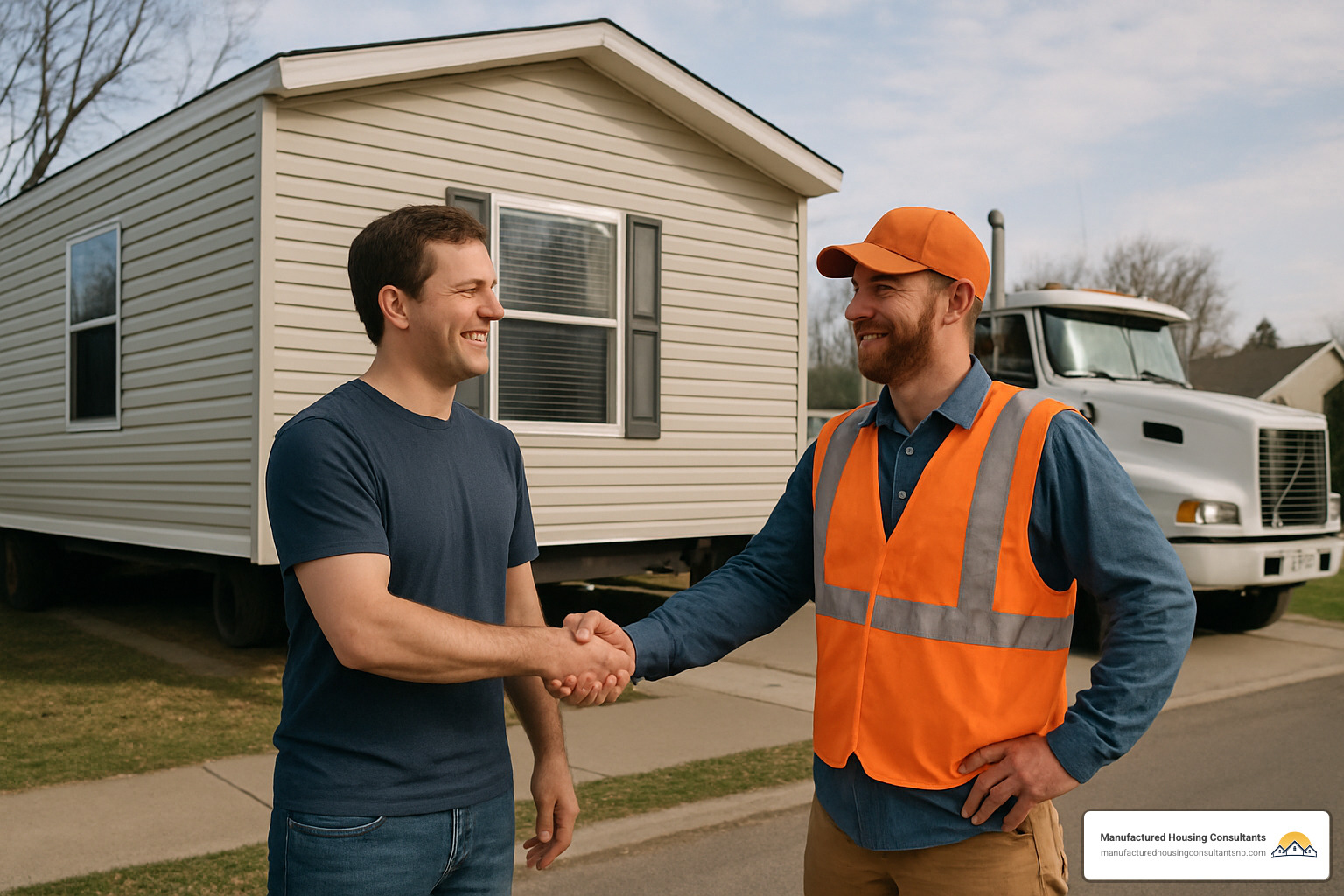
Finding a trustworthy mobile home mover is like finding a good doctor—you want someone with the right credentials, experience, and bedside manner. Here’s how to separate the professionals from the pretenders.
Start by verifying their USDOT Number—every legitimate interstate mover must have one. Check for state-specific licenses for mobile home transport; requirements vary by location. Ask for proof of insurance certificates covering both liability and cargo damage. Verify their local business registration to ensure they’re properly established, and look for HUD certification if they’ll be handling setup services.
When interviewing potential movers, dig deeper than just price. Ask about their years of experience moving homes like yours. Inquire about the specific equipment they’ll use for your home type. Request recent customer references and actually call them! Clarify which permits they’ll handle versus what falls to you. Understand their insurance coverage limits and what exactly is covered. Find out if they handle both transport and setup or just one piece of the puzzle. Finally, ask about their contingency plans for bad weather or unexpected delays.
One of our customers put it perfectly: “We Will Transport made my experience easy from pickup to delivery, great communication from the get-go.” That kind of feedback speaks volumes about a company’s professionalism and customer service approach.
At Manufactured Housing Consultants, we always suggest getting at least three quotes from different providers. Check online reviews and Better Business Bureau ratings before making your final decision. The cheapest quote isn’t always the best value—experience and reliability are worth paying for.
Getting an Accurate Mobile Home Relocation Services Quote
To receive a quote that won’t surprise you later with hidden costs, be prepared to share detailed information about your move.
First, gather your home specifications. Know the exact dimensions (length, width, height), the year, make, and model of your home, how many sections it has, and be honest about its current condition. Photos from multiple angles help tremendously.
Next, compile your location details. This includes your current address with notes about access challenges (narrow roads, low-hanging branches, etc.) and your destination address with site conditions (slope, soil type, etc.). Mention any potential route challenges like low bridges or weight-restricted roads.
Be clear about your service requirements. Do you need transport only, or full service including disconnection and setup? What utilities need disconnection and reconnection? What type of foundation will you use at the destination? Does your home require special handling due to age or condition?
Finally, consider your timing needs. When would you ideally like to move? How flexible is your schedule? Are there any hard deadlines driving your timeline?
“We care about your total satisfaction in your mobile home buying experience” isn’t just a slogan at Manufactured Housing Consultants—it guides everything we do, including providing transparent, detailed quotes that account for all aspects of your move.
For the most accurate quote possible, take current photos of your home from all angles, measure all dimensions carefully, and have documentation about your home’s specifications ready. These simple preparations help ensure you’ll get a quote you can rely on as you plan your budget.
More info about Contact Us to get started with your personalized quote today!
Conclusion & Next Steps
Relocating a mobile home is a significant undertaking that requires careful planning, professional expertise, and attention to detail. At Manufactured Housing Consultants, we understand the complexities involved and are committed to making your relocation experience as smooth as possible.
Based in New Braunfels, Texas, our team offers comprehensive mobile home relocation services that cover everything from initial assessment to final setup. We pride ourselves on our guaranteed lowest prices and wide selection of housing options from 11 top manufacturers.
Key takeaways from this guide include the essential nature of professional movers—the complexity, legal requirements, and safety considerations simply make DIY moves impractical and potentially dangerous. Planning well in advance is crucial, especially since permit processes can sometimes take months for a smooth relocation.
When budgeting, remember to consider all costs comprehensively, from transport and permits to site preparation and setup. And please, take the time to choose qualified providers by verifying licensing, insurance, and references before entrusting your home to a transport company. Finally, preparing your home properly by following pre-move checklists helps ensure your home arrives safely at its destination.
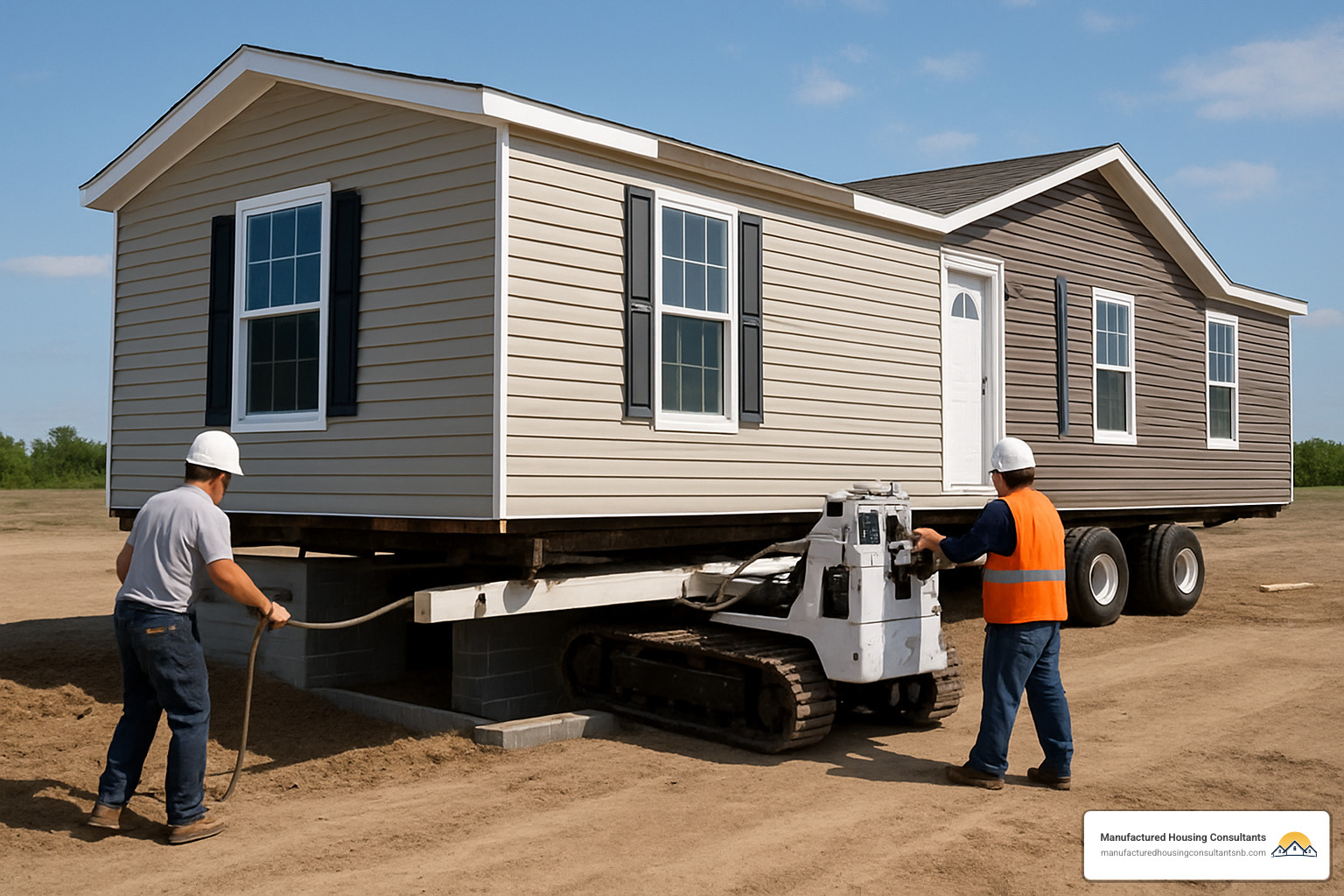
Our team at Manufactured Housing Consultants is ready to assist with every aspect of your mobile home relocation. Whether you’re moving within New Braunfels, elsewhere in Texas, or considering purchasing a new manufactured home, we offer the expertise and support you need.
We also provide financing options to help make your relocation or new home purchase more affordable. Don’t worry about your land either—our land improvement services ensure your property is perfectly prepared for your home.
As one industry professional puts it, “The juice is definitely worth the squeeze.” While mobile home relocation involves significant effort and investment, the ability to keep your existing home while moving to a new location offers tremendous value and convenience.
Ready to discuss your mobile home relocation needs? Contact Manufactured Housing Consultants today for a free, no-obligation quote and expert guidance throughout your moving journey. We’re here to make what seems overwhelming feel manageable and even exciting as you start on this new chapter.

